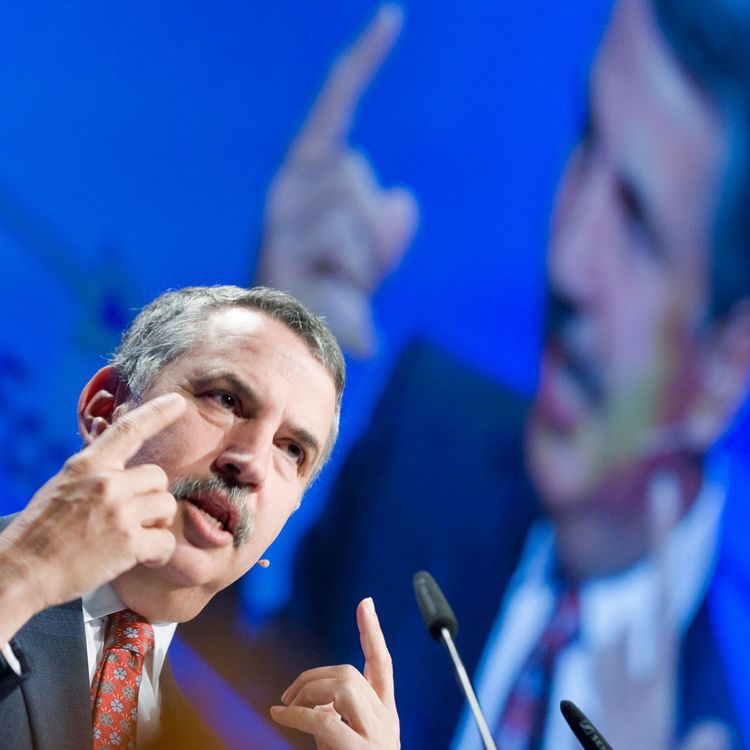Share

The Economist Asks
The Economist asks: Thomas Friedman
•
Is technology making us populists? App makers and Silicon Valley executives wax lyrical about technological disruption. But millions perceive innovation as a threat - are they wrong? Best-selling author Tom Friedman joins us. Anne McElvoy hosts
More episodes
View all episodes

The Economist Asks: Can we learn to disagree better? An episode from our archive
34:15|In a polarised world, the opportunities to disagree are plentiful – and frequently destructive. In one of our favourite episodes of 2022, host Anne McElvoy asks Adam Grant, an organisational psychologist and the author of “Think Again”, why he thinks the key to arguing well is to be open-minded. They discuss whether social media erode reasoned argument, and the new breed of powerful political communicators. Plus, how does the psychology of resilience help those who are “languishing”?Please subscribe to The Economist for full access to print, digital and audio editions:www.economist.com/podcastoffer
The Economist Asks: What's the secret of happiness?
24:50|The pursuit of happiness continues to puzzle everyone from philosophers to politicians. But how can science help the search? Host Anne McElvoy asks Tal Ben-Shahar, an expert in positive psychology and the author of “Happier: No Matter What”, how evidence-based research can improve well-being. Plus, what’s the best way to make new year’s resolutions stick? Please subscribe to The Economist for full access to print, digital and audio editions: www.economist.com/podcastoffer
The Economist Asks: Why is history a family affair?
26:30|Host Anne McElvoy asks the historian and writer Simon Sebag Montefiore why he believes the story of human history has been shaped by the family unit. The author of "The World: A Family History" considers what all dynasties have in common and what the future holds for monarchies in Britain and beyond. Plus, do men and women hold onto power differently?We’re constantly thinking about how we can make better podcasts for our listeners. To help us do that, please fill out this short questionnaire: economist.com/economistaskssurveyPlease subscribe to The Economist for full access to print, digital and audio editions:www.economist.com/podcastoffer
The Economist Asks: How is Ukraine coping with the trauma of war?
29:19|After her brother died fighting in Luhansk in 2017, the historian and author Olesya Khromeychuk channelled her grief by writing “The Death of a Soldier Told by His Sister”. Host Anne McElvoy asks her how war and resistance has shaped the identity of Ukraine and Ukrainians and what the country could look like once the conflict ends.Please subscribe to The Economist for full access to print, digital and audio editions:www.economist.com/podcastofferWe’re constantly thinking about how we can make better podcasts for our listeners. To help us do that, please fill out this short questionnaire: economist.com/economistaskssurvey
The Economist Asks: Will Germany succeed in transforming its foreign policy?
22:37|Days after Russia’s invasion of Ukraine, Olaf Scholz, the German chancellor, announced a radical shift in the country’s foreign and security policy. Host Anne McElvoy asks Christoph Heusgen, a former advisor to Angela Merkel, whether the Zeitenwende (“turning point”) will be delivered or derailed. The veteran diplomat, who now chairs the Munich Security Conference, also assesses Germany’s China policy and how to mend fences with European allies.Please subscribe to The Economist for full access to print, digital and audio editions: www.economist.com/podcastofferWe're constantly thinking about how we can make better podcasts for our listeners. To help us do that, please fill out this short questionnaire: economist.com/economistaskssurvey
The Economist Asks: How could Ukraine win the war?
28:53|Ben Hodges, a former commanding general of US Army Europe, believes that Ukraine has achieved “an irreversible momentum” since the liberation of Kherson. He predicts the country could declare victory against Russia by the summer. Host Anne McElvoy asks him how Ukraine could pull it off. He assesses whether Western countries will hold their nerve as the conflict drags on and what could happen if Vladimir Putin loses on the battlefield.Please subscribe to The Economist for full access to print, digital and audio editions: www.economist.com/podcastoffer
The Economist Asks: Will the clean-energy transition be fast enough?
26:58|As the end of COP27 nears, US energy secretary Jennifer Granholm talks to Anne McElvoy from the climate summit in Egypt. They discuss the impact the global energy crisis is having on Joe Biden’s green agenda, whether the hype around hydrogen will endure and if the president is willing to put aside a tussle with China for the sake of climate cooperation. Plus, Vijay Vaitheesawaran, The Economist’s global energy and climate innovation editor, measures the ambitions declared at COP27 against what is achievable.Please subscribe to The Economist for full access to print, digital and audio editions:www.economist.com/podcastoffer
The Economist Asks: What does Binyamin Netanyahu’s comeback mean for Israel and the world?
25:00|Binyamin Netanyahu is set to return to power in Israel, after winning a majority in last week’s general election. His coalition is likely to include Religious Zionism, a far-right bloc. Host Anne McElvoy asks Anshel Pfeffer, The Economist’s Israel correspondent and a biographer of Mr Netanyahu, what the partnership could mean for Israel’s democracy. And David Makovsky of the Washington Institute assesses how the change in government could affect Israel’s alliance with America and burgeoning relationships in the Middle East.Please subscribe to The Economist for full access to print, digital and audio editions: www.economist.com/podcastoffer
The Economist Asks: Can New York solve its housing crisis?
21:52|Eric Adams, the mayor of New York, grew up on the verge of homelessness. Now he’s in charge of fixing the city’s housing crisis. Host Anne McElvoy asks him how he plans to do it. They discuss how an influx of 20,000 migrants, many from the southern border, adds to the problem. Mr Adams, a former police captain, defends his record tackling violence and relays his concerns about the Democrats’ pitch ahead of the midterms.Please subscribe to The Economist for full access to print, digital and audio editions: www.economist.com/podcastoffer